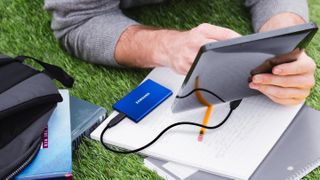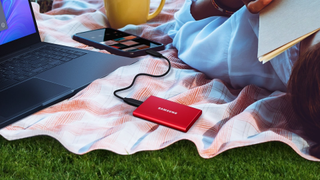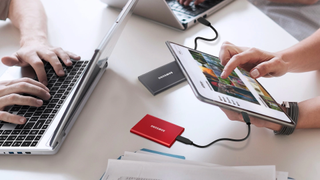How to buy the right external SSD for you

Buying an external SSD is one of the wisest decisions you can make. These handy portable devices quickly and easily plug into your laptop, allowing you to expand the storage space of your device without having to physically open up your PC.
Also, thanks to technology such as Solid State Drives (SSDs) and ever faster connections, such as USB-C and Thunderbolt 3, external SSDs can offer blistering speeds that let you move files to and from them as quickly as an internal drive. Since Samsung launched its ground-breaking Portable SSD T1 in 2015, the company has been at the forefront of this external SSD revolution.
So, if you’re thinking of buying an external SSD, let us show you how you can buy the perfect one for your needs.

How much space do you need?
Back when external SSDs were just emerging, they were more expensive than external drives that used traditional hard drives, and offered less capacity. It meant if you wanted the speed of an external SSD, you had to sacrifice capacity and affordability.
The good news is that these days, that’s not the case. According to Samsung’s internal data, back in 2012 the price per gigabyte for a NAND flash SSD was $1.17 per gigabyte. In 2016 this dropped to $0.36, and in 2019 it dropped further to just $0.15 per gigabyte. This means SSDs in general are now more affordable than ever – and that’s true for external SSDs as well.
Thanks to Samsung’s multi-bit NAND and V-NAND technology, which allowed the company to add additional layers of memory cells on top of each other. The more cells the SSD has, the more capacity it has to store data. Layering them on top of each other helps increase the storage size of the SSD, without greatly expanding the physical size – leading to larger capacity SSDs which are faster and more affordable.

Size matters
For external SSDs, the use of 3D V-NAND technology means you can get large capacity drives that are extremely small and portable.
Back in 2015, the Samsung T1 was smaller than a business card and weighed just 30 grams. Along with the T3 in 2016 and the T5 in 2017, these external SSDs allow you to easily carry around extra storage space – just slip them into a pocket or bag and take them everywhere with you.
Culminating in the new Samsung T7, these external SSDs are perfect for people who do a lot of travelling, or students who need to carry their files around school and campus as they attend classes.
The T7 takes performance to new levels for an external SSD, with the embedded PCIe NVMe technology offering incredible sequential read/write speeds of up to 1,050/1,000 MB/s – almost twice as fast as the (already speedy) T5.

So does speed
Speed is incredibly important when you’re buying a new external SSD. No one wants to wait around while files are copied to and from an external drive, so if you need near instant access to large files, Samsung’s portable SSD X5 will be for you.
These external SSDs are able to reach new heights of performance thanks to a combination of the NVMe (Non-Volatile Memory Express) interface and Thunderbolt 3 connection, which uses the USB-C connection found in many modern laptops and computers and which allows data transfer speeds of up to 40Gbps. In a nutshell, it’s really, really fast.
The new Samsung T7 Touch, then, is the perfect external SSD for people requiring top-of-the-range data transfer speeds.

Keeping your data secure
While modern SSDs being smaller and more portable than ever before is undoubtedly a good thing, there is one drawback – they can be easier to lose (or get stolen). That can be annoying and upsetting at the best of times, but if your external SSD contains private information, for example customer records for your business, then them falling into the wrong hands can be disastrous.
The good news is that many external SSDs come with advanced security features. These can be software-based, which encrypts your data and only allows it to be accessed with a password, and hardware-based as well.
Physical security measures add an extra layer of protection to your data. In some cases, this takes the form of a keypad that you enter in a PIN to unlock the data.
Other external SSDs, like the Samsung T7 Touch, use biometrics. With a built-in fingerprint sensor, the T7 Touch allows you to quickly and easily access your data, while ensuring that nobody else can. Combined with AES 256-bit password encryption, which is available on all Samsung portable SSDs, you can be sure that your data is completely secure.
Get daily insight, inspiration and deals in your inbox
Get the hottest deals available in your inbox plus news, reviews, opinion, analysis and more from the TechRadar team.
